 When Chrysler last updated
its 300 in 2011, the fullsize sedan market was a very different place
than it is today. Ford's redesigned Taurus was in showrooms, sure, but
segment stalwarts like the Toyota Avalon and Chevrolet Impala were languishing at the tail end of their model cycles.
When Chrysler last updated
its 300 in 2011, the fullsize sedan market was a very different place
than it is today. Ford's redesigned Taurus was in showrooms, sure, but
segment stalwarts like the Toyota Avalon and Chevrolet Impala were languishing at the tail end of their model cycles.And still, the second-generation 300 (not counting the "letter series" cars from the 1950s and '60s, of course) failed to recapitulate the booming success of the model reboot in 2004. Something in the combination of the down economy, higher gas prices and great product from front-wheel-drive entries in the class kept the 300 from the six-digit sales numbers it saw in the early 2000s.
For the 2015 model year, Chrysler hopes that a more clearly defined purpose for its big sedan, combined with liberal dipping into the corporate tech toy box, will rekindle buyer interest. Considering the mild characters and front-driver dynamics of its mainstream competition, the promise of V8 power and rear-wheel drive should at least turn the heads of those looking for a car with a little edge.
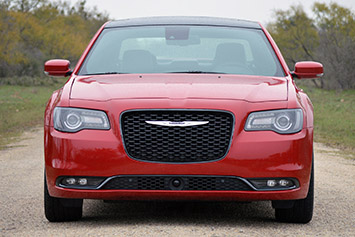
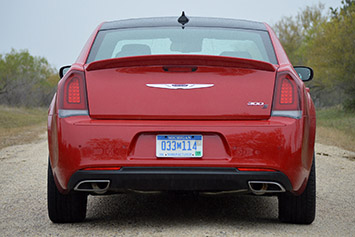
I grabbed the keys of the edgiest of the bunch, the sport-intended 300S, and found a big sedan that gives away some practicality to the rest of its segment mates. The trade-off for the dip in pragmatism is an uptick and driving fun and attitude that should make all the difference for the right buyer.
Even though the hard-to-miss face of the 300 has come in for another nip and tuck, that attitude is still clearly on display, too. The grille of the 300 is some 33-percent larger than the outgoing model, though it's still far less brutal than the throwback styling of the 2005 "Baby Bentley" car, at least to my eyes. The cheese grater insert is metallic in most trims of the 300, though the 300S you see in my photo set gets the meaner blacked-out treatment.
A quick scroll through our gallery will show you that the rest of the 300 has been similarly changed but not reinvented. Light clusters front and rear are revised, the rear clip has been re-forged with less busy styling, and the whole car has been de-chromed to a large extent (this 300S is wearing the least blingy outfit of the bunch). That rear spoiler is S-model specific.
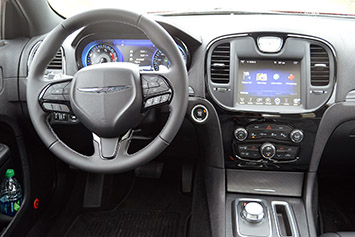
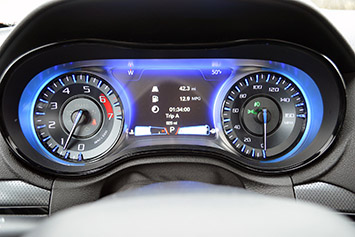
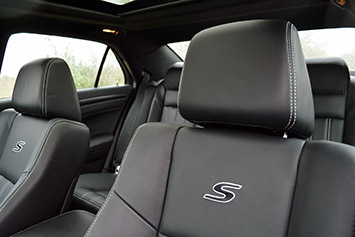
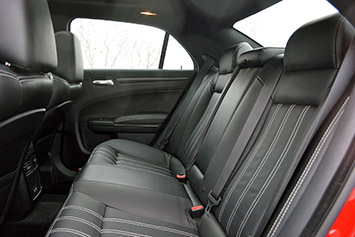
I held the existing 300 interior in fairly high regard, and this new car improves on that base. The black-on-black interior you see here is probably the most staid of the bunch in the new lineup, but the S car can also be had with rather daring blue leather, and the uplevel 300C and 300 Platinum have tactile treats like softer leather and open-pore wood trim, if that's your thing.
The two most eye-catching upgrades, across the board, are a sleek new instrument cluster, and, sigh... yet another installation of the company's rotary shift knob. The new gauges are surrounded by a very three-dimensional surround, and highlighted with ambient lighting that's frankly hard to capture in a daytime photo shoot. Suffice it to say that the lightscape is very modern looking when the sun goes down.
The shifter, on the other hand, is just fine, I suppose. I've never liked the action on the rotary knob, and I can't really see what space-saving good has been wrought by it (that slim cubby you see next to it is good for holding a single pen). Still, people seem to like the twisty selectors...
Thankfully, the transmission attached to the dorky rotary shift knob is now the excellent eight-speed automatic, with both the V6 and the V8 engine options. The bonus to fuel economy (16 city and 25 highway for my V8 car) is nice, as is the reaction time of the autobox. Chrysler offers a Sport mode for the transmission that allows for more aggressive gear-holding, and it'll also give you a full manual mode with the steering-wheel-mounted paddle shifters if you so desire. I don't care for the half-size paddles found behind the 300 wheel, but the sport mode does a great job kicking down quickly on its own.
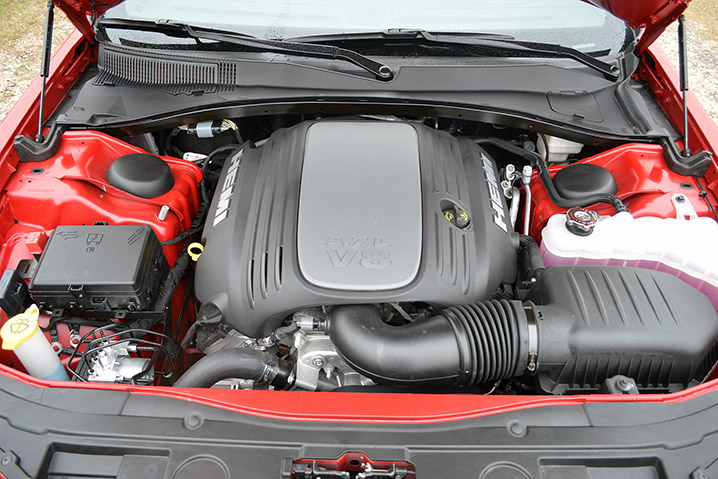
Of course, the star of the powertrain show – and still the biggest differentiator for the 300 line – is the 5.7-liter V8 engine. The 300 SRT8 won't be making an appearance for the 2015 model year (presumably the performance sedan duties have been handed off indefinitely to the Dodge Charger), but this 5.7-equipped, S-model car is a great half-measure. Outputs of 363 horsepower and 394 pound-feet of torque are enough to better just about everything that you could legitimately cross-shop here, barring, perhaps, the Chevy SS, though that's arguably more of a competitor to the Charger.
Better yet, the big V8 offers stirring response and an enthusiastic soundtrack when you stomp on the throttle. For a big, two-ton sedan, the effort required to execute passes or blow past your local highway speed limit is minimal. With peak horsepower (5,200 rpm) and peak torque (4,200 rpm) near the top of the 5,800-rpm redline, that eight-speed trans comes in handy keeping the whole affair boiling, too.
And staying in the powerband was a mission critical affair, as I tossed the 300 around some of Central Texas' most driver-friendly landscapes.
The Hill Country just outside of Austin has stretches of bending roadways that seem custom-laid for shaking down a sports car suspension. Quick ascents and dives, narrow near-switchbacks snaking on the sides of hills and no shortage of bumps and whoops allow for testing the lateral and vertical movement of a car's underpinnings.
Even in the guise of my 300 S, with its "sport-tuned" suspension, I wasn't left convinced that this is the perfect test course for the big Chrysler. On the plus side, there was a lot less vertical motion while quickly cresting hills than I'd imagined; the S never felt as though it was going pull a Duke Boys jump when I topped a knoll with pace. On the downside, that big 300 body moved side-to-side on its stems more than I'd like for quick driving. Lateral stiffness felt okay when pushing quickly through long sweepers, but was less adept at slalom-like directional revisions.
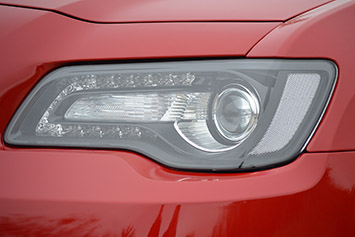
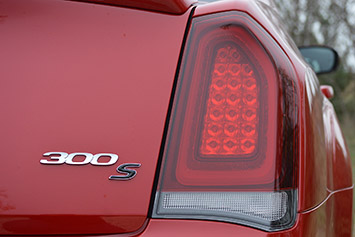
Stick to the straighter, flatter areas of Texas and the 300 will feel plenty confident, though. Horses for courses.
The whole 300 range gets electrically assisted power steering for the 2015 model year, replacing the hydraulic assisted rack of the outgoing car. With the sportier tuning of the 300 S, I am happy to report that the tiller offers nice weight and directness, though it still lacks much road feel. A short stint in the V6 300, however, proved to me that the EPAS effect was a lot lighter and less satisfying in that guise.
Chevy's burly SS is a player in terms of power and size, but its $45k starting price is well over the $35ish it takes to buy a '15 300 with the V8 option (about $3,000). Starting prices are even steeper for the luxury-oriented, V8-powered Kia K900 and Hyundai Genesis Sedan, and 300 money will only just get you into much less powerful and significantly smaller rear-drive compacts from full-on luxury players like BMW and Mercedes-Benz.
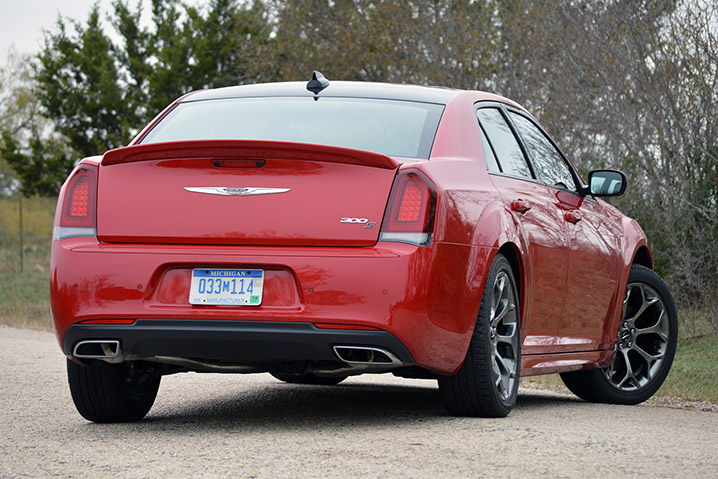
Really the best straight-ahead comparison I can come up with is the all-wheel-drive, turbo-charged Ford Taurus SHO. Both Ford and Chrysler are fast and a little inert, but, to my eyes the 300 wins on its more impressive curb appeal.
Sure, the V6 models will carry the volume for the 300 marque going forward from here, but I still think the V8 car, especially this rock 'n' roll 300S, offers the most unique ownership experience. Big, powerful, ballsy and unapologetic are the qualities that made the 300 such a hit ten years ago. Strangely then, in a resurgent segment that projects nothing but growth, it's still the closest formulation of that original machine that is most compelling today.
Is a Chrysler 300 – with huge wheels and a blacked out grille and a blatting exhaust – going to turn the head of your daily Avalon driver? Probably not. Will that same car lure excitement-seeking buyers into Chrysler showrooms? My bet is yes.
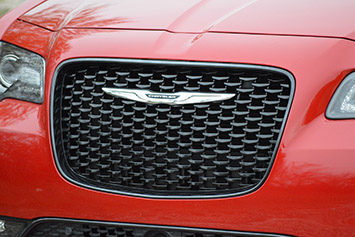
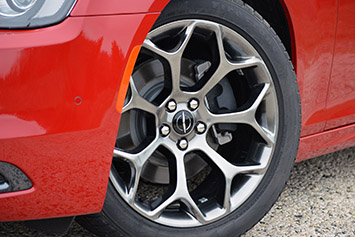
No comments:
Post a Comment